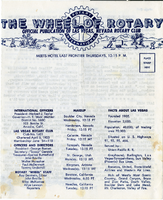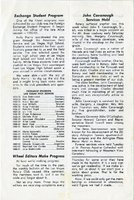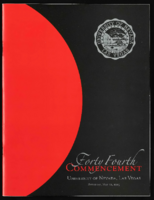Search the Special Collections and Archives Portal
Search Results

Transcript of interview with Robert, Ann, Joseph, Patrick, & David Genoves by Shirley Emerson, August 29, 2013
Date
Archival Collection
Description
Text

The Wheel of Rotary Las Vegas Rotary Club newsletter, July 8, 1954
Date
Archival Collection
Description
Text

Maila Aganon oral history interview: transcript
Date
Archival Collection
Description
Oral history interview with Maila Aganon conducted by Kristel Peralta, Cecilia Winchell, and Stefani Evans on June 10, 2021 for Reflections: The Las Vegas Asian American and Pacific Islander Oral History Project. Maila Aganon discusses her childhood, family upbringing, and immigration to the United States from the Philippines when she was a college student. She shares how her parents moved to Las Vegas first and Maila followed a decade later, investing in real estate and eventually taking up permanent residence. Maila talks about her employment history with Allstate Insurance, Bank of America, AAA, Caesars Entertainment, and finally Aon as a Senior Vice President. She also shares her thoughts on the growth of Las Vegas and the growth of the Asian community and cultural influence within the city. Subjects discussed include: anti-Asian violence; Filipino grocery stores; Filipino foods; remote work.
Text

The Wheel Las Vegas Rotary Club newsletter, 1960s-1970s
Date
Archival Collection
Description
Text

Transcript of interview with Oscar Goodman by Claytee D. White November 10, 2014
Date
Archival Collection
Description
Oscar Baylin Goodman (1939- ) is the former mayor of the city of Las Vegas, Nevada, serving 12 years until 2011, when he swore in his wife of over 50 years, Carolyn Goodman. Oscar Goodman is the official ambassador of Las Vegas, and the chairman of the Las Vegas Convention and Visitors Authority (LVCVA) Host Committee. He is also known as one of the best criminal defense attorneys in the United States, and spent 35 years defending alleged Mob figures such as Meyer Lansky, Frank Rosenthal, and Anthony Spilotro. Goodman is the primary visionary and a member of the board of directors of The Mob Museum in downtown Las Vegas, which opened in 2012. Goodman was born June 26, 1939 in Philadelphia, Pennsylvania. He earned his undergraduate degree from Haverford College in 1961 and his law degree from the University of Pennsylvania Law School in 1964. That same year he moved to Las Vegas and in 1965 he was admitted to the Nevada State Bar. He served as Clark County?s chief deputy public defender from 1966 to 1967. Goodman was elected as mayor of Las Vegas for the first time in 1999. During his three terms (the legal limit), he contributed to the economic and cultural development of the downtown area by supporting projects such as the arts district and Union Park, a high-rise residential and business project he helped to secure 61 acres of land for. He helped to begin what he called the ?Manhattanization? of downtown, which included the construction of taller buildings for better use of the area?s prime real estate. In this interview, Goodman discusses the role of Judaism in his life, from childhood to adulthood to parenting his own four children. He touches on his involvement with Temple Beth Sholom, including serving as its president, as well as in local development projects like the Lou Ruvo Cleveland Clinic Brain Health Center, Smith Center for the Performing Arts, and Mob Museum. In addition, Goodman discusses the impact of Jewish residents on the city and its development, and mentions leaders in the gaming industry, legal profession and in politics.
Text
Howard Hughes Public Relations Photograph Collection
Identifier
Abstract
The Howard Hughes Public Relations Photograph Collection depicts the activities of businessman Howard Hughes from 1930 to 1950. The photographs primarily depict aircraft flown by Hughes or designed by the Hughes Aircraft Company, including the XF-11 reconnaissance plane, the HK-1 Hercules (or "Spruce Goose"), and the Hughes H-1 Racer. The photographs also depict celebrations following Hughes's circumnavigation flight in New York City, New York and Chicago, Illinois in 1938. Lastly, the photographs include Hughes testifying in front of the Senate Special Committee to Investigate the National Defense Program in 1947.
Archival Collection

University of Nevada, Las Vegas (UNLV) 44th commencement program
Date
Archival Collection
Description
Commencement program from University of Nevada, Las Vegas Commencement Programs and Graduation Lists (UA-00115).
Text

Carol Frey oral history interview: transcript
Date
Archival Collection
Description
Oral history interview with Carol Frey conducted by Claytee D. White on March 30, 2018 for the Remembering 1 October Oral History Project. In this interview, Carol Frey discusses her work as a volunteer for the Trauma Intervention Program (TIP) of Southern Nevada. She specifically talks about the October 1, 2017 mass shooting in Las Vegas, Nevada and her volunteer efforts at one of the hospitals, where she provided support for survivors of the shooting, answering any questions they had, calling family members, arranging transport of loved ones to Las Vegas, and any other assistance that was needed, either emotional or practical. Throughout the interview, Frey discusses the moments that have stuck with her, including the gestures of gratitude the TIP volunteers had received from United Health Care employees and Sandy Hook High School students.
Text

